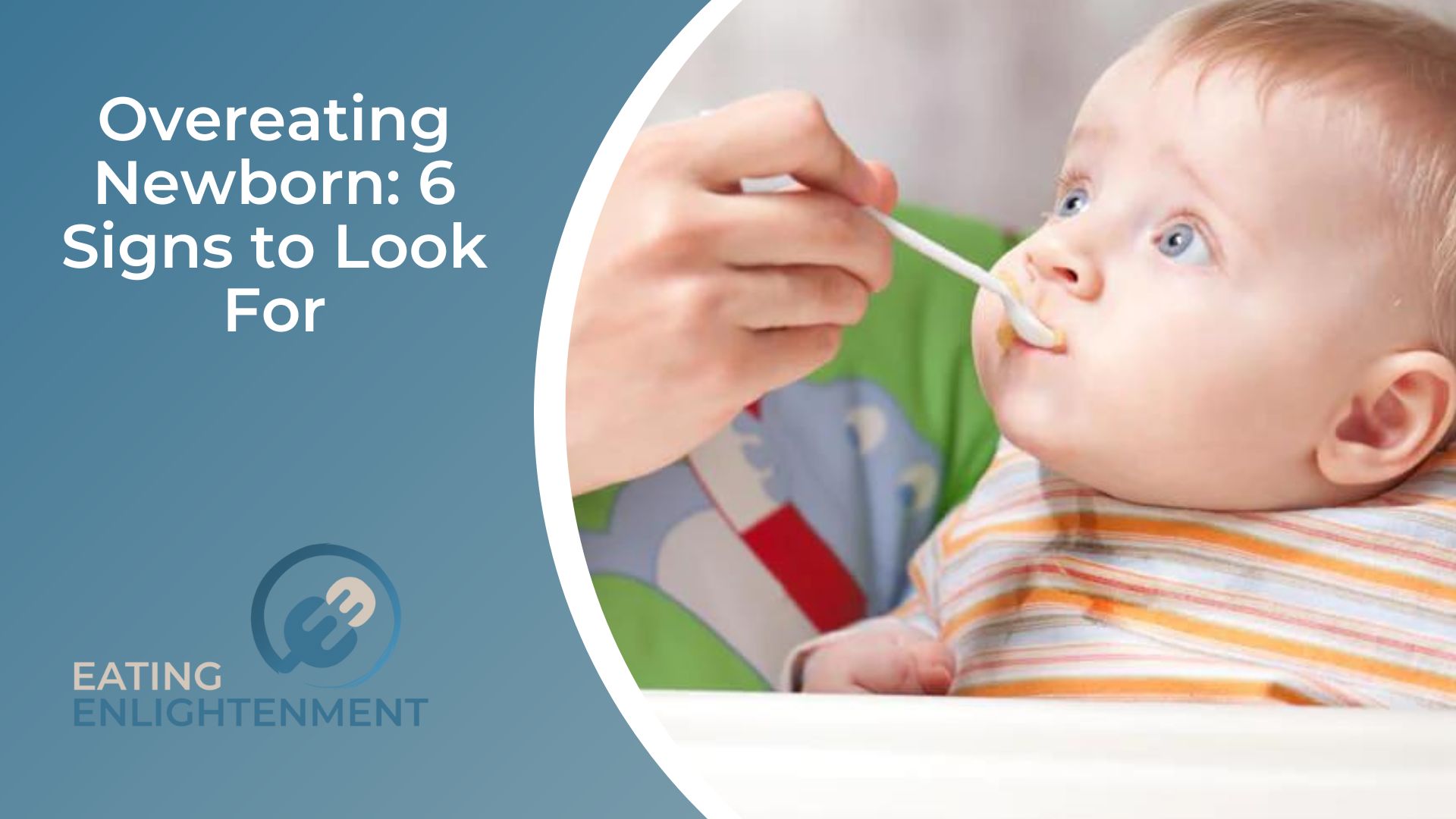Congratulations on the birth of your new baby! This is such an exciting time, but it can also be a bit overwhelming. One of the things you may be wondering about is whether or not your newborn is overeating. After all, they’re so tiny, how can you tell if they’re getting too much food?
Here are six signs that your newborn may be overeating:
If you notice any of these signs, it’s important to speak with your child’s pediatrician as soon as possible. They can help you determine if your newborn is in fact overeating and offer guidance on what to do next.
On the other hand if you want a group that talks about overeating for adults, learn more about Overeaters Anonymous here. But since this post is about newborns, let’s dive in!
How do you know when your baby is full? What are the signs?

Your child can tell you everything you need to know just by watching their body language.
Watch the reaction of a child to food before, during and after feeding. The child may pull the bottle away or turn his head away from the breasts. They can fuss, begin squealing, arch their heads or decrease their volume to stop sucking.
A happy baby will display signs of relaxed hand movement, close-eyes and extended arms and legs, and overall calmness.
Here are the 6 signs that may indicate that your baby is being overfed:
1. Crying
One of the most common signs that your baby is full is if they start to cry. This is usually a sign that they are uncomfortable and want to be put down. If your baby is crying, it’s best to try burping them or changing their position first, as they may just be uncomfortable and not actually hungry.
2. Turning Away from the Breast or Bottle
Another common sign that your baby is full is if they turn away from the breast or bottle. This is usually a sign that they have had enough to eat and don’t want any more. If your baby turns away from the breast or bottle, it’s best to try burping them or changing their position first, as they may just be uncomfortable and not actually hungry.
3. Clenching Their Fists
Another sign that your baby is full is if they start to clench their fists. This is usually a reflexive action that babies do when they are full and don’t want any more food. If your baby starts to clench their fists, it’s best to try burping them or changing their position first, as they may just be uncomfortable and not actually hungry.
4. Spitting Up Frequently
Spitting up is a common occurrence in babies, and it doesn’t necessarily mean that they are full. However, if your baby is spitting up large amounts of milk or formula, it could be a sign that they are overeating and need to be burped or have their position changed.
5. Falling Asleep at the Breast or Bottle
Falling asleep at the breast or bottle is another common sign that your baby is full. This usually happens when babies are very tired and their natural instinct is to fall asleep when they are no longer eating. If your baby falls asleep at the breast or bottle, it’s best to try burping them or changing their position first, as they may just be tired and not actually hungry
6. Gaining weight more quickly than normal
If your baby is consistently gaining more weight than the average for their age, then it could be a sign of overfeeding. It’s important to keep an eye on your baby’s growth and development and note any rapid increases in their weight, so that you can take action if needed.
Why Overeating can be a Problem for Newborns
It’s normal for newborns to eat often, but it’s possible for them to overeat too much milk if they’re not getting the right balance of nutrients. This can lead to problems such as obesity, sleep problems, and digestive issues. In severe cases, it can even cause death.
That’s why it’s so important to make sure your newborn is eating the right amount of food and getting the nutrients they need.
If you’re breastfeeding, this means making sure you’re eating a well-balanced diet yourself and drinking plenty of fluids. If you’re formula-feeding, this means following the directions on the formula bottle carefully and not overfeeding your baby.
Bottle fed babies can be at risk of overfeeding as absent-minded feeding (for example during a TV show) might accidentally lead to the newborn babies consuming too much breast milk or formula.
Letting Your Newborn Unwind After a Feeding

After a feeding, it’s important to let your newborn unwind for a bit before burping them or putting them down for a nap. This gives their bodies time to adjust and prevents them from becoming agitated or agitated which can lead to overeating later on.
How often should my newborn be fed?
Every newborn baby has different needs and requirements when it comes to feeding.
Most doctors recommend that full-term, healthy newborns should be breast or chest-fed on a cue-based schedule at least twice daily.
This means that the mother should observe their baby’s cues, such as hunger, tiredness, and contentment before deciding when to feed them. The mother can also observe the the baby’s sucking reflex during bottle feeding or with breast milk.
As the baby gets older, he/she will require longer feeds with more milk added per session.
While some babies may skip the first feed of the day and only drink small amounts of milk or formula to keep hydrated, every child’s needs are different and have to be adjusted according to them.
Ultimately, consulting a healthcare professional is advised when planning a child’s feeding schedule in order to make sure that the newborn gets all of the nutrients they need to grow healthily.
What should I do if my baby spits out?
It can be worrisome when your baby’s milk intake gets disrupted when your baby spits out food, but with the right strategies it doesn’t have to disrupt mealtime.
Experts advise parents to take a step back, clean the mess up and let their baby decide when they are ready for a fresh new meal. If your little one looks content and alert after spitting out the food, then it’s not necessary to replace it immediately; this is often more about parents worry than about any real problem.
Additionally, it is important to hone in on signs of hunger that implies readiness for another meal, such as hand and mouth rubbing or pulling at clothes.
Finally, don’t worry too much about seemingly large wet spots on clothing; it’s usually much bigger than it appears in reality from the saliva being spread around. Sometimes parents mistakenly overfeed a baby because they overestimate how much food spilled due to the saliva spread.
By following these tips, you can help your baby feel comfortable while still staying mindful of them getting enough nutrition during meals so their healthy growth continues.
What is overfeeding in babies and what to do about it?
Overfeeding a baby is a very common problem, and it can have serious impacts on their health and wellbeing. Although most often times – whether a bottle fed baby or breastfed babies – you can still have a healthy baby even with some overfeeding!
However, if overfeeding a baby happens very frequently this means the infant gets more calories than they should through food, formula, or breastmilk. Ysually because of incorrect portions or inappropriate types of nutrition.
Many parents struggle to recognize overnutrition in their children, but there are a few signs that can help you assess if your baby is being overfed.
These include excessive weight gain, irritability between feedings, frequent bloating and vomiting, binge eating habits, short sleep cycles due to discomfort from overfeeding, and digestive issues like constipation or diarrhea.
If you notice any of these signs, you can do things to decrease overfeeding likelihood.
- Make sure to practice portion control for each meal by giving them the right amount for their age group
- Limit sugary drinks or other liquids with empty calories
- Use healthy snacks
- Introduce slow feeding techniques such as pausing during feeding sessions to help reduce overfeeding risk while promoting proper digestion.
Following these tips could help prevent any potential problems associated with overfeeding in babies. By taking steps today to recognize and modify behaviors before they become habits can help make sure your child grows up with healthy eating habits!
Remember that a unique approach is needed when it comes to weaning off the bottle or breastfeeding while setting appropriate limits on food quantity and variety provided so that nutrition is well balanced overall with just enough milk.
With this approach your baby will have the best chance at avoiding the negative effects of daily overfeeding.
How a baby’s body responds to overfeeding
When a baby is overfed, their body has to work harder to digest more food than it needs. This can lead to the digestive system becoming overwhelmed and unable to process all of the extra nutrients properly.
This can result in uncomfortable symptoms such as bloating, constipation, and abdominal pain. Overfeeding can also cause excessive weight gain which can put stress on the bones and joints. In some cases, this excess weight can even lead to health complications such as heart disease or diabetes later in life.
Finally, overfeeding may affect your baby’s sleep patterns by making them feel uncomfortable during naps or night-time because their stomach is too full. Poor sleeping habits are linked with various physical and mental health issues so it’s important to pay attention to your baby’s sleeping pattern.
It’s crucial for parents to be aware of the potential consequences of overfeeding their babies and to take steps to prevent it. Proper portion control, healthy snacks and slow feeding techniques are important tools for parents to help prevent overnutrition and ensure their child is getting the right amount of nutrition for optimal growth and development.
Which babies are at risk of overfeeding?
Babies who are premature or born with low birth weight may be at a higher risk of being overfed as they require more nutrition to gain healthy weight. Additionally, babies that have been hospitalized for medical reasons are also more likely to be overfed as formula and other supplements are often given in large quantities.
Lastly, parents should also take into consideration their child’s age when deciding how much to feed them. As children grow older, the amount of food they need decreases so it is important to adjust portion size accordingly.
Overall, it is essential for parents to pay close attention to their baby’s nutritional needs and ensure that they are provided with enough but not too much nutrition each day.
Why is my newborn overeating?
There are several factors that can lead to a newborn overeating. It could be because they are getting too much nutrition, either through formula or breastfeeding, or it could be due to a lack of proper portion control or failure to recognize when the baby is full.
It is important for parents to pay attention to their baby’s cues and identify signs of overfeeding so that changes can be made before problems arise. Additionally, slow feeding techniques such as pausing during feedings can help promote good eating habits and reduce the risk of overfeeding.
By taking steps today to prevent overfeeding and ensure your baby is receiving the right amount of nutrition for optimal growth and development, you can set them up for a healthier future!
Conclusion
Overeating is a common problem among newborns, but it’s one that can have serious consequences if left untreated. If you think your newborn may be overeating, don’t hesitate to speak with their pediatrician right away. With the right care and treatment, your baby will be back on track in no time!



